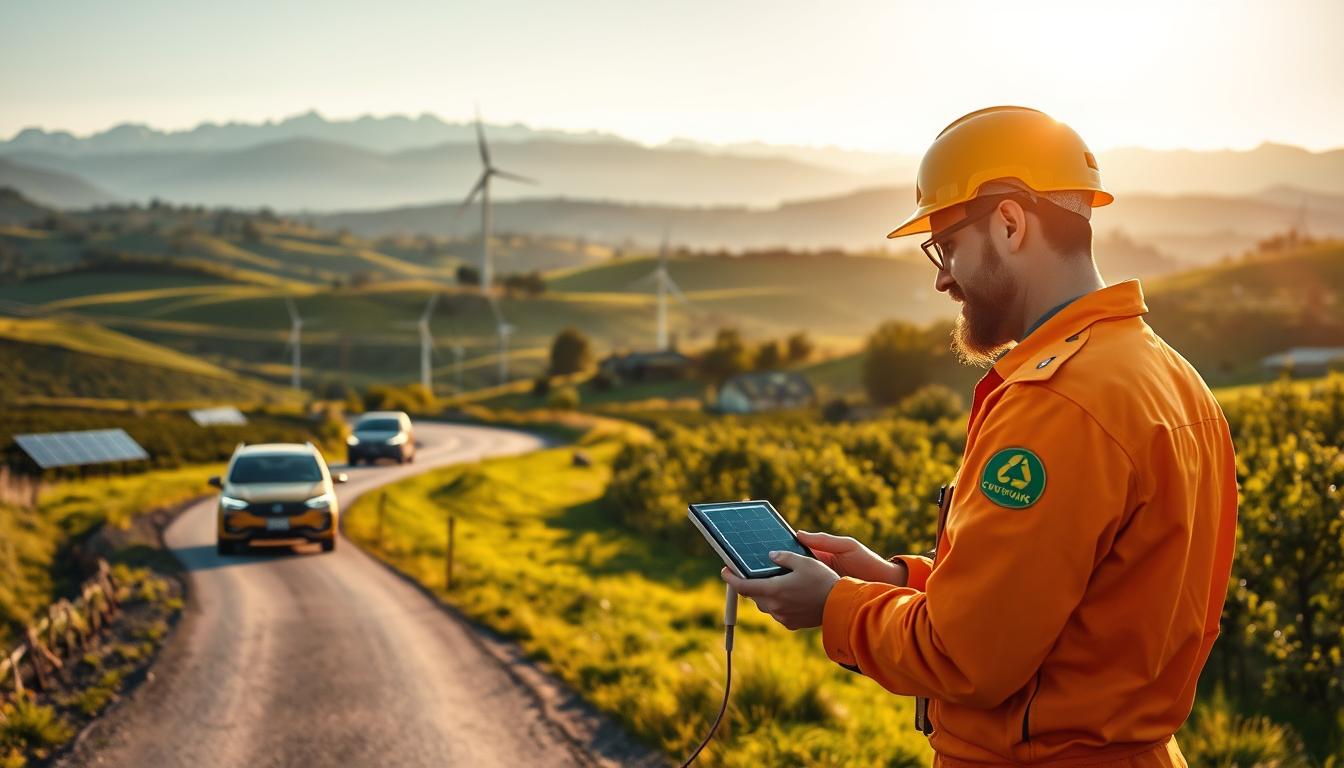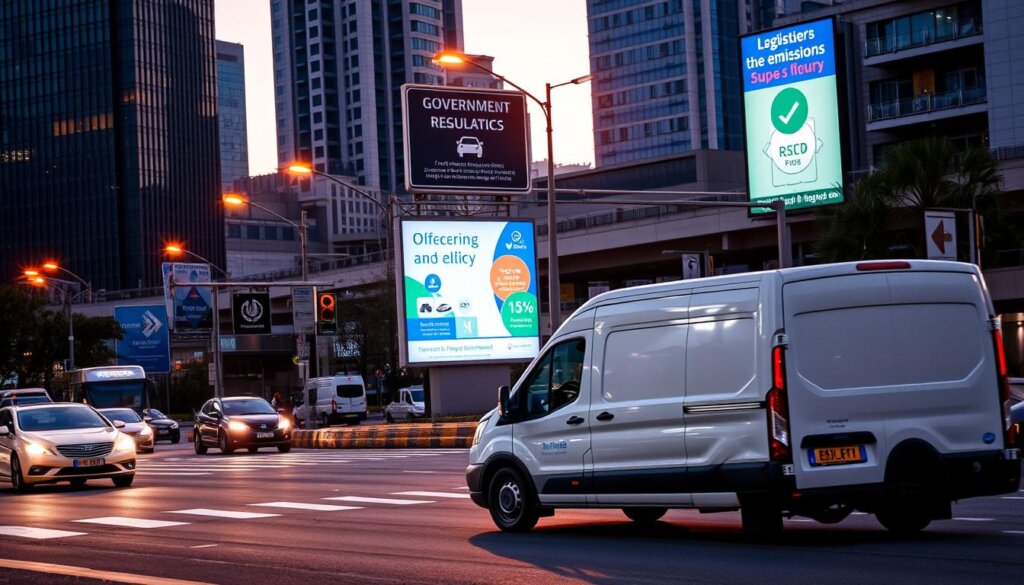Did you know that last-mile delivery emissions are almost 29% of all transportation greenhouse gases? This is a huge number that shows we really need to make field service more sustainable. With more people shopping online, we need better ways to deliver goods without harming the planet.
I think making field service more eco-friendly is not just the right thing to do. It also meets what customers are starting to expect. In this article, we’ll look at ways field service companies can cut down on emissions. This will help make our future cleaner and greener.

Key Takeaways
- Last-mile delivery emissions represent a significant portion of transportation greenhouse gases.
- Transitioning to eco-friendly delivery solutions is essential for sustainability.
- Consumer expectations are shifting towards greener practices in delivery services.
- Field service organizations need innovative strategies for reducing emissions.
- Adopting sustainable practices can lead to operational cost savings.
- Engagement in green initiatives enhances brand loyalty and customer satisfaction.
Understanding Last-Mile Emissions
Last-mile emissions are the carbon dioxide and pollutants from the final delivery of packages. With more online shopping, last-mile logistics have grown a lot. Experts predict a 78% increase in these activities by 2030.
This growth causes more traffic in cities, harming our environment. If we don’t act, carbon emissions from deliveries could rise by 60%.
These emissions have big effects on our carbon footprint and air quality. By learning more about last-mile emissions, we can talk about how to reduce their impact. This way, we can help our planet.
What is Sustainable Field Service?
Sustainable field service combines eco-friendly practices with daily operations. It aims to reduce the environmental impact of maintenance. In my experience, this approach is key for several reasons.
It meets regulations and boosts brand reputation. It also meets customers’ growing demand for sustainable maintenance. Sustainability is now a core part of business strategy, not just a dream.
Definition and Importance
The core of sustainable field service is reducing ecological footprints through smart resource use. It aims to cut waste, use resources wisely, and improve efficiency. Recognizing these elements helps my organization lead in our green mission.
Key Strategies in Sustainable Practices
Effective sustainable practices rely on several key strategies. One important one is using resources better, like with new technologies. These can cut down fuel use and emissions a lot.
Training team members in green methods also builds a culture of care for the environment. This lets sustainable field service grow and succeed in our company.
Current Challenges in Last-Mile Logistics
The rise in online shopping has made delivery demands skyrocket. This has put a lot of pressure on businesses to deliver fast while also caring for the environment. Unfortunately, more cars on the road mean more pollution.
Rising Delivery Demand
Online shopping has made people want things faster. This has led to more cars on the road, causing traffic jams and pollution. Companies struggle to keep up with these demands, making it hard to manage their resources well.
Environmental Impact of Delivery Vehicles
Delivery cars are a big source of pollution, making up about 30% of CO2 emissions in logistics. This number could jump by 60% by 2030. The pollution from these cars is making cities dirtier. Bad delivery practices, like failed attempts and too much packaging, make things worse.
Technological Innovations for Sustainable Field Service
Using new technology is key to making field service better and greener. Good tools help us work more efficiently and meet our green goals. Two big steps forward are better route planning and smart dispatch systems.
Multi-stop Route Optimization
Route optimization changes how we make deliveries. It uses smart algorithms to find the best routes. This cuts down on fuel use and pollution.
Adding machine learning makes it even better. It helps us make more deliveries with fewer trips. This makes customers happy and helps the planet.
Dynamic Dispatch Management
Dynamic dispatch changes how we manage deliveries. It uses real-time data to assign tasks. This makes our work more efficient.
It also cuts down on carbon emissions a lot. In some cases, it’s over 21,000 tons a year. This smart way of working helps us be more green.
Eco-Friendly Maintenance Solutions
In the world of sustainable field service, green equipment maintenance is key. It helps us use eco-friendly practices. Keeping our tools and vehicles in top shape is good for the planet and boosts our work.
Regular upkeep means our gear works better. This cuts down on energy use and pollution. It also makes our equipment last longer.
Importance of Green Equipment Maintenance
Choosing green maintenance lets me pick sustainable parts and use energy-saving tools. This way, I help lower my operation’s carbon footprint. Eco-friendly upkeep also saves money on fuel and repairs.
Utilizing Sustainable Practices in Operations
Using sustainable practices every day is vital. It means recycling, cutting down on plastics, and teaching my team to save resources. This makes my business more appealing to customers who care about the environment.
These actions help us work towards a greener future. They show we’re serious about being environmentally responsible.
Government Regulations Impacting Last-Mile Emissions
Exploring last-mile logistics, I see how key regulations are for better sustainability. U.S. rules shape how companies meet environmental standards. They set strict limits to cut carbon emissions from logistics, with big fines for not following them.
This pushes companies to use greener practices in their delivery work.
U.S. Environmental Regulations
The U.S. has strict rules to meet high environmental standards. These rules set clear limits on emissions for logistics companies. Following these rules helps my business stay compliant and boosts its reputation.
Global Initiatives for Reducing Emissions
Worldwide, efforts aim to cut carbon by 2030. These plans urge companies to use eco-friendly practices. Working with governments and other businesses helps us create lasting change.

Strategies for Reducing Last-Mile Emissions
Exploring ways to cut last-mile emissions, electric and cargo bikes are key. They lower carbon footprints and help navigate through busy cities. Switching to these bikes shows a strong commitment to green logistics.
Utilization of Electric and Cargo Bikes
Electric and cargo bikes are vital for green delivery. They cut down emissions and make logistics more efficient. Companies using these bikes choose a green and flexible way to transport goods.
Implementing Out-of-Home Delivery Models
Out-of-home delivery models are also effective. Options like automated lockers and pick-up points offer flexibility. They reduce trips, lowering emissions and pleasing customers. This approach meets environmental goals and customer needs.
Benefits of Sustainable Field Service
Adopting sustainable field service practices offers many benefits. One key advantage is cost efficiency and operational savings. By optimizing routes, companies can cut down on fuel use, saving money. This is good for the planet and also boosts profits.
Efficient practices improve productivity and support green consumerism. This allows businesses to grow financially while doing good for the environment.
Cost Efficiency and Operational Savings
Sustainable field services aim to find cost-effective solutions. By reducing unnecessary expenses, companies can save a lot. Looking closely at operations, from planning routes to using resources, reveals savings.
Going green doesn’t just meet ethical standards. It also makes a business more profitable. This shows that sustainability is good for both the planet and the wallet.
Enhanced Customer Satisfaction and Brand Loyalty
Today, customer happiness is key to brand loyalty. People prefer brands that care about the environment. When I make a choice, I want it to help the planet.
Brands that focus on sustainability build better relationships with customers. They gain trust and loyalty. By valuing green consumerism, companies can stand out as leaders in sustainability.
Best Practices for Sustainable Workforce Management
Effective sustainable workforce management is key to reaching environmental goals. Training technicians is at the heart of this effort. It gives them the skills to promote environmental awareness. This training boosts knowledge of green practices and empowers employees to use them in their work.
Training Sustainable Service Technicians
When training technicians, I make sustainability a core part of their education. This approach gives them technical skills and an eco-friendly mindset. By teaching the value of sustainable practices, I ensure they know how to reduce emissions and support green initiatives.
This training makes the workforce more sustainable. It leads to big improvements in how things get done.
Engaging the Workforce in Green Initiatives
Getting the workforce involved in green initiatives is essential. I promote this through team activities that focus on caring for the environment. Asking for feedback on green practices brings new ideas and boosts morale.
Recognizing the efforts of employees makes them proud and responsible. This strengthens the team’s commitment to sustainability.

Conclusion
Sustainable field service practices are key to cutting down last-mile emissions. The path ahead is tough, with more deliveries and the harm from vehicles. But, using new tech and green methods offers hope for logistics’ future.
Field service groups can get better and show they care about the planet. They can lead the way, ready for new challenges and helping our planet.
The journey to a greener field service is about more than rules. It’s about building a culture of care and new ideas. I urge everyone to dive into these green practices. Let’s make a difference for the next generations.
See how FieldAx can transform your Field Operations.
Try it today! Book Demo
You are one click away from your customized FieldAx Demo!
FAQ
What are last-mile emissions and why are they important?
Last-mile emissions are the pollutants from the final delivery of packages. They’re key because e-commerce growth has increased these emissions. This can harm urban air quality and the environment.
How can sustainable field service practices benefit my business?
Sustainable field service reduces your environmental impact. It also boosts your brand and customer satisfaction. Plus, it can cut costs by optimizing routes and reducing waste.
What key strategies can companies adopt for sustainable field service?
Companies can use several strategies. These include optimizing resource use and minimizing waste. They can also use eco-friendly maintenance and renewable energy. Training staff on sustainability is also important.
What role does technology play in reducing last-mile emissions?
Technology like route optimization and dynamic dispatch is key. It helps businesses make better decisions, use less fuel, and cut emissions.
How do government regulations affect logistics operations?
U.S. regulations push for lower carbon emissions from logistics. Not following these can result in big fines. So, companies must adopt green practices to avoid penalties.
What are some practical eco-friendly solutions I can implement?
You can use electric and cargo bikes for deliveries. Try out-of-home delivery models and keep your vehicles in good shape. These steps help reduce emissions and improve efficiency.
How can I engage my employees in sustainability efforts?
Engage employees through training and team activities focused on the environment. Also, recognize their contributions to sustainability. This builds a shared commitment to being eco-friendly.
Author Bio
Co-Founder & CMO at Merfantz Technologies Pvt Ltd | Marketing Manager for FieldAx Field Service Software | Salesforce All-Star Ranger and Community Contributor | Salesforce Content Creation for Knowledge Sharing






